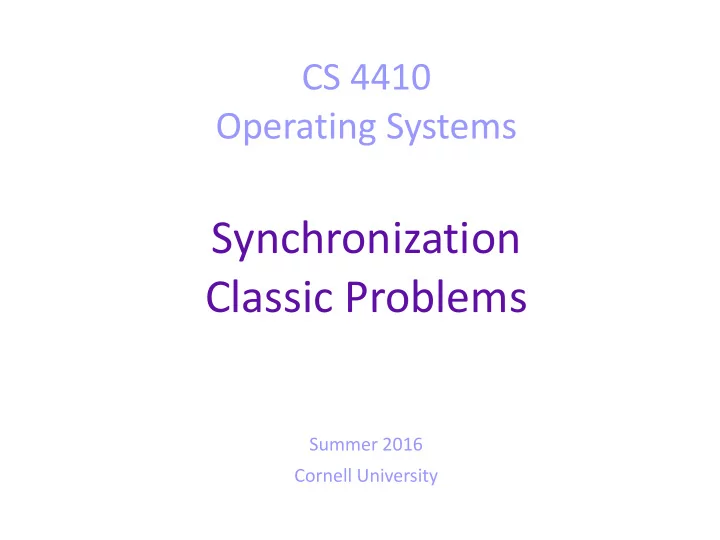

CS 4410 Operating Systems Synchronization Classic Problems Summer 2016 Cornell University
Today ● Producer-Consumer Problem ● Bounded-Buffer Problem 2
Restrictions on accessing shared data • For a multithreaded process to be correct, some restrictions should be applied to when thread access shared data. • Semaphores can model these restrictions. • We see how semaphores can model different kinds of restrictions in two different problems. 3
Producer-Consumer Problem One bounded buffer with N entries. ● Multiple producer- threads: fill buffer’s entries. ● Pointer In shows the next entry to be filled. ● Each producer fills the entry pointed by In , advances In to point to ● the next entry. Multiple consumer- threads: empty buffer’s entries. ● Pointer Out shows the next entry to be emptied. ● Each consumer empties the entry pointed by Out , advances out to ● point to the next entry. 0 1 N-1 In Out 4
Producer-Consumer Problem ● Shared data between all threads: buffer. ● Shared data between producers: In . ● Shared data between consumers: Out . ● Requirements on shared data: ● Only one thread should modify the buffer at any time. ● No production when all N entries are full . ● No consumption when no entry is full. 5
Selecting semaphores for satisfying restrictions • Requirements on • Semaphores on shared data: shared data: 1. Only one thread 1. Mutex should modify the buffer at any time. 2. Counter 2. No production semaphore when all N entries initialized at N. are full . 3. Counter 3. No consumption semaphore when no entry is initialized at 0. full. 6
Producer-Consumer Problem Shared data: buffer, “In”, “Out” Shared Semaphores: mutex, empty, full; mutex = 1; /* for mutual exclusion*/ empty = N; /* number empty buf entries */ full = 0; /* number full buf entries */ Producer Consumer do { do { //produce item //consume item //update “In” //update “Out” } while (true); } while (true); 7
Producer-Consumer Problem Shared data: buffer, “In”, “Out” Shared Semaphores: mutex, empty, full; mutex = 1; /* for mutual exclusion*/ empty = N; /* number empty buf entries */ full = 0; /* number full buf entries */ Producer Consumer do { do { P(empty); P(full); //produce item //consume item //update “In” //update “Out” V(empty); V(full); } while (true); } while (true); 8
Producer-Consumer Problem Shared data: buffer, “In”, “Out” Shared Semaphores: mutex, empty, full; mutex = 1; /* for mutual exclusion*/ empty = N; /* number empty buf entries */ full = 0; /* number full buf entries */ Producer Consumer do { do { P(empty); P(full); P(mutex); P(mutex); //produce item //consume item //update “In” //update “Out” V(mutex); V(mutex); V(empty); V(full); } while (true); } while (true); 9
Readers-Writers Problem ● One file. ● Many reader-threads: read data from the file. ● Many writer-threads: write data to the file. 10
Readers-Writers Problem ● Shared data between all threads: file. ● Requirement: ● At any point of time, the file may be accessed only by one writer or by multiple readers. Need some additional state to count the active readers. 11
Readers-Writers Problem ● Shared data between all threads: file. ● Shared data between readers: readcount. ● Requirements: ● At any time, the file may be accessed only by one writer or by multiple readers. ● At any time, readcount may be accessed by one reader. 12
Selecting semaphores for satisfying restrictions • Semaphores on • Requirements on shared data: shared data: 1. At any time, the file 1. Mutex may be accessed 2. Mutex only by one writer or by multiple readers. 2. At any time, readcount may be accessed by one reader. 13
Readers-Writers Problem Reader mutex = Semaphore(1) do{ wrt = Semaphore(1) readcount = 0; Writer do{ /*reading is performed*/ /*writing is performed*/ }while(true) }while(true) 14
Readers-Writers Problem Reader mutex = Semaphore(1) do{ wrt = Semaphore(1) readcount = 0; P(wrt); Writer do{ /*reading is performed*/ P(wrt); /*writing is performed*/ V(wrt); }while(true) V(wrt); }while(true) 15
Readers-Writers Problem Reader mutex = Semaphore(1) do{ wrt = Semaphore(1) P(mutex); readcount = 0; readcount++; if (reardcount == 1) P(wrt); Writer V(mutex); do{ /*reading is performed*/ P(wrt); P(mutex); /*writing is performed*/ readcount--; V(wrt); if (readcount == 0) }while(true) V(wrt); V(mutex); }while(true) 16
Today ● Producer-Consumer Problem ● Bounded-Buffer Problem 17
Coming up… ● Next lecture: monitors ● HW2: all exercises except for repair.py can be solved 18
Recommend
More recommend